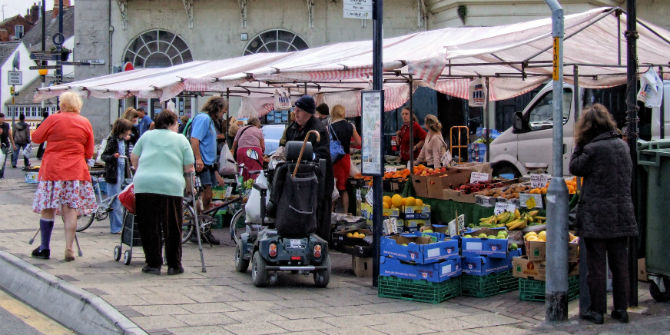
 What do the public in East Anglia, where both Leave (in rural Lincolnshire) and Remain (in Cambridge) polled strongly, want from Brexit? Catherine Barnard (left) and Amy Ludlow held public engagement events in school halls, community centres, prisons and market squares in parts of Lincolnshire, Norfolk, and Cambridgeshire in early 2017. They found a striking degree of moderate consensus: a desire for Single Market access with a rebalanced free movement of people. That said, despite Theresa May’s claim that the country is coming together, discussions revealed deep wounds and a divided society, generationally and geographically.
What do the public in East Anglia, where both Leave (in rural Lincolnshire) and Remain (in Cambridge) polled strongly, want from Brexit? Catherine Barnard (left) and Amy Ludlow held public engagement events in school halls, community centres, prisons and market squares in parts of Lincolnshire, Norfolk, and Cambridgeshire in early 2017. They found a striking degree of moderate consensus: a desire for Single Market access with a rebalanced free movement of people. That said, despite Theresa May’s claim that the country is coming together, discussions revealed deep wounds and a divided society, generationally and geographically.
‘I don’t feel as scared about the future now as I did immediately after the referendum, but it does feel like the calm before the storm. Like we are all being lulled into a false sense that things will be alright.’ (Participant at Boston Grammar School, Lincolnshire)
Most of our engagement events finished with discussion about the messages people would like to send to Theresa May and her Government. From this, emerged helpful insights into how participants were currently feeling.
First, regret was expressed, in some places on both sides of the debate, about how the referendum campaign had been conducted. There was a sense among participants that the tone of the referendum debate and, in the case of some Remain voters also its outcome, had damaged or diminished the UK’s international standing. As one participant in Holt put it:
‘A little bit of the light of the beacon of Britain has gone out.’

Some participants, especially those living in communities where many EU nationals also live, reported feeling embarrassed or awkward about the referendum outcome. This was especially the case in Cambridge, and in Boston, where one schoolteacher said:
‘There are lots of Eastern European children at my school. I feel that the Brexit outcome has betrayed them. It feels awkward and difficult and embarrassing.’
Many participants were concerned about racism or bad feeling among groups from different countries within their communities. One participant in Holt described the UK post-referendum as ‘Divided Britain’. In this context, some felt it important to emphasise the valuable contributions of people who come to the UK from other countries, arguing, for example, that ‘British success is built on migrants’ or that ‘Eastern Europeans are some of the hardest working people I know’. Some also shared stories of where they had been told negative things about a group of non-nationals and, through direct personal experience, had come to see those things as unfounded. For example, in Peterborough, one man told us that he had been ‘told that Poles are racist but then I lived next door to one and liked him and so we used to go to the gym together’.
We did not find evidence of significant concern about hostility from the local population among the recently arrived non-nationals in the English as a Foreign Language class. One of the students at the class who had lived in the UK for a year said that he had ‘never felt unwelcome in the UK’. When we asked why, he said ‘Unlike people who live here I can just go home if things get too bad.’ This may suggest that the views of EU nationals who have lived in the UK for longer periods are likely to be less positive. There was clear consensus and strong feeling across all of our engagement activities that the Government should act quickly to protect the rights of EU nationals who were already resident and working in the UK. Counterintuitively perhaps, we were told in Boston that the town had been able to secure additional funding for improvement:
‘Boston got the label of being the most racist town in Britain. Weirdly the Brexit vote has generated a platform, given us some leverage to get some positive change and investment.’
Second, there was generally significant anxiety among our participants. Some anxiety was about uncertainty and the ‘eerie quietness’ that had ‘descended’ since the referendum decision. One participant in Boston described it as ‘like the calm before the storm’ and ‘like […] being lulled into a false sense that things will be alright’. In addition to concerns about harmonious community relations, specific anxieties were raised about Ireland, and the possibility of renewed conflict there, and about the disintegration of the UK, in light of the strength of the Remain vote in Scotland. There was also real concern about the cost of Brexit and whether this had been accounted for. As one participant in Peterborough put it:
‘We’re on our arse as a country. It’s costing money for all this Brexit carry on. Who is counting the cost of that?’
There was strong and widespread appetite for continued engagement by politicians as important decisions are made moving forward.
Third, beyond anxiety, we also found anger and resentment. This was expressed by some of the 48% who voted Remain, but it was most strongly expressed by young people. Many of the young people we met expressed anger because a decision had been taken over which they had no say, but with which they would have to live for the rest of their lives. As one (German) student in Holt put it:
‘How can it be that a 12-year-old who will be living this future gets no say but an 85-year-old who won’t be here much longer is allowed to make their choice?’
Another student in Cambridge argued:
‘My options and my future have been ignored by people who voted out. People who will be dead in a few years were allowed a say, but I wasn’t as someone who is going to have to live with these decisions for the rest of my life.’
Though some young people saw the benefits of listening to the older generation who could remember a time when the UK was not part of the EU, or when the EU did not exist, many were frustrated as what many saw as a decision motivated by a ‘backwards-looking nostalgia for something that never really existed.’
This is an extract from Unravelling and reimagining the UK’s relationship with the EU: Public engagement about Brexit in the East of England. It represents the views of the authors and not those of the Brexit blog, nor the LSE.
Catherine Barnard is Professor of EU Law at the University of Cambridge.
Amy Ludlow is a Lecturer in Law at Gonville and Caius College, Cambridge.
Also by these authors: What minimum wage? Why enforcement of EU workers’ employment rights matters







These days, a lot of children have imbibed the conceit that many left-leaning teachers and academics have sought fit to teach drip-drip from the Sixties onward.It has of late come under some scrutiny from people who might conceivably be inclined to be patriotic about their country, believe in their country and moreover are convinced that such country or nation-state should be sovereign and be able to act unilaterally.
It is understandable that students have their own view on life.They have every right to an opinion.However, it is nonsense on stilts for adults to suggest that because children have a future longer than older people, on the balance of probabilities, they children, should have a say in the running of the country.The adults who push this line are simply sabotaging and undermining the sovereignty of the nation-state, or, in this case, the nations-state, and democracy with it.It cannot be reasoned.It does not stand up to any argument against it.It is pure sabotage of democracy.Perhaps these adults arguing that children should have a say in the running of the country on matters as important as sovereignty, never mind a say on the running of the house they are lucky enough to be living in, should suggest that children sit on the board of all multinationals which operate in the country and to have a veto on all board decisions.That would be fair, because these corporations determine the future of everybody.A child of 12 years of age would have a say in Brexit?An 85 year old who has worked and paid tax all his/her life and fought in WWII should not have a say in this matter, or an equal voice with a 12 year old?Really, whichever adult is saying that should be thoroughly ashamed of themselves.But, aye, there’s the rub.These people who have some political agenda like giving children a vote on such a thing as Brexit, they cannot seriously be arguing for democracy-Utopia maybe.
For an 85 year old to have fought in WW2, they could only have been 13 years old when it ended, the British forces did not recruit children to fight in that war.
Even if individuals have fought in that war or any other, it gives no more right to a say on other’s future, especially where the consequences of a change will be felt for many decades into the future.
Mathematically speaking, yes. I am in my sixties, still living through the war during the Fifties.It took the Sixties to even half forget the trauma. So the hypothetical 85 years old fought the war at home. According to your logic, even the unborn should have a say in national affairs. I think it more appropriate to expect adults who are part of an electorate to make decisions with the wellbeing of future generations in mind.